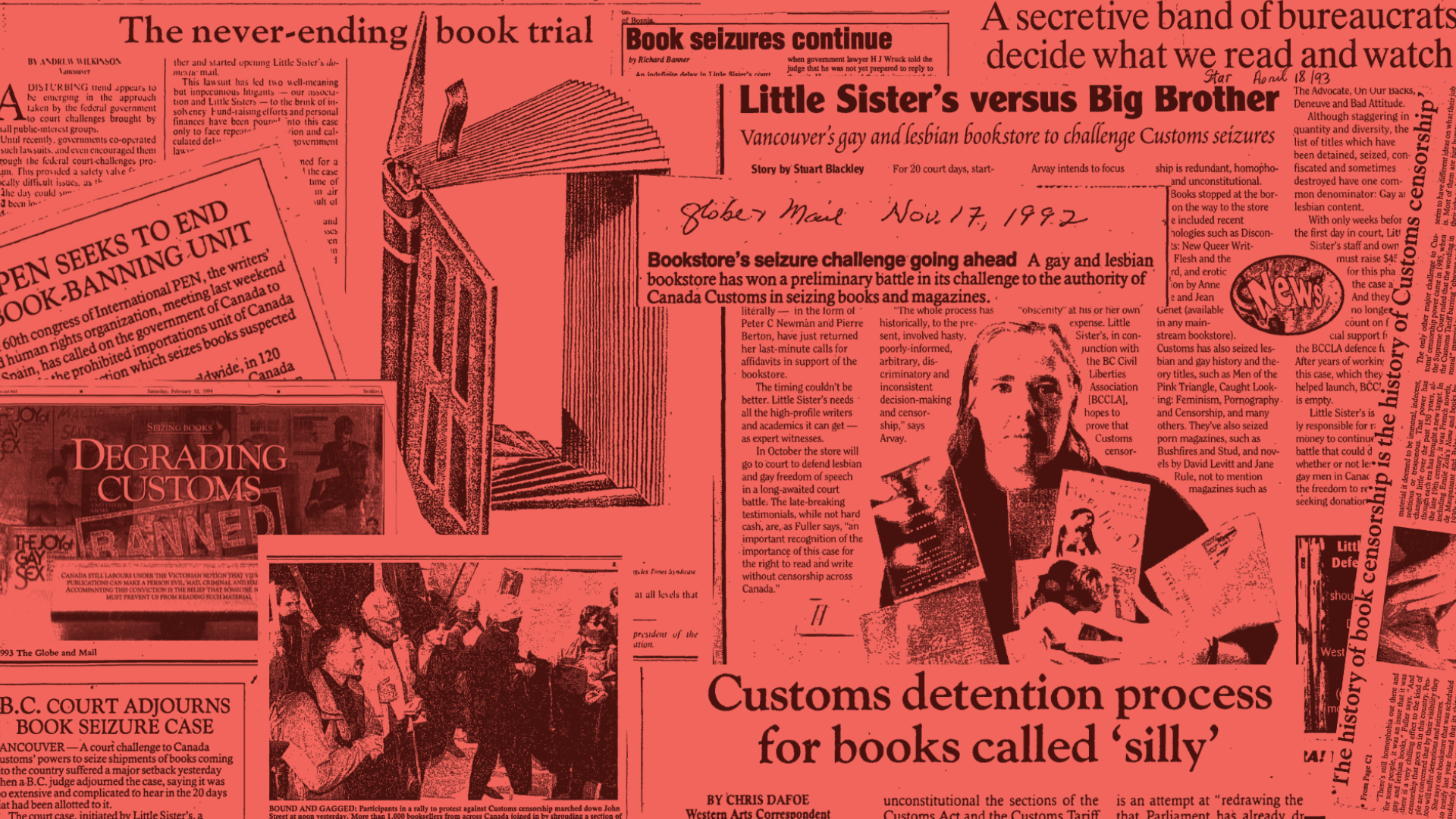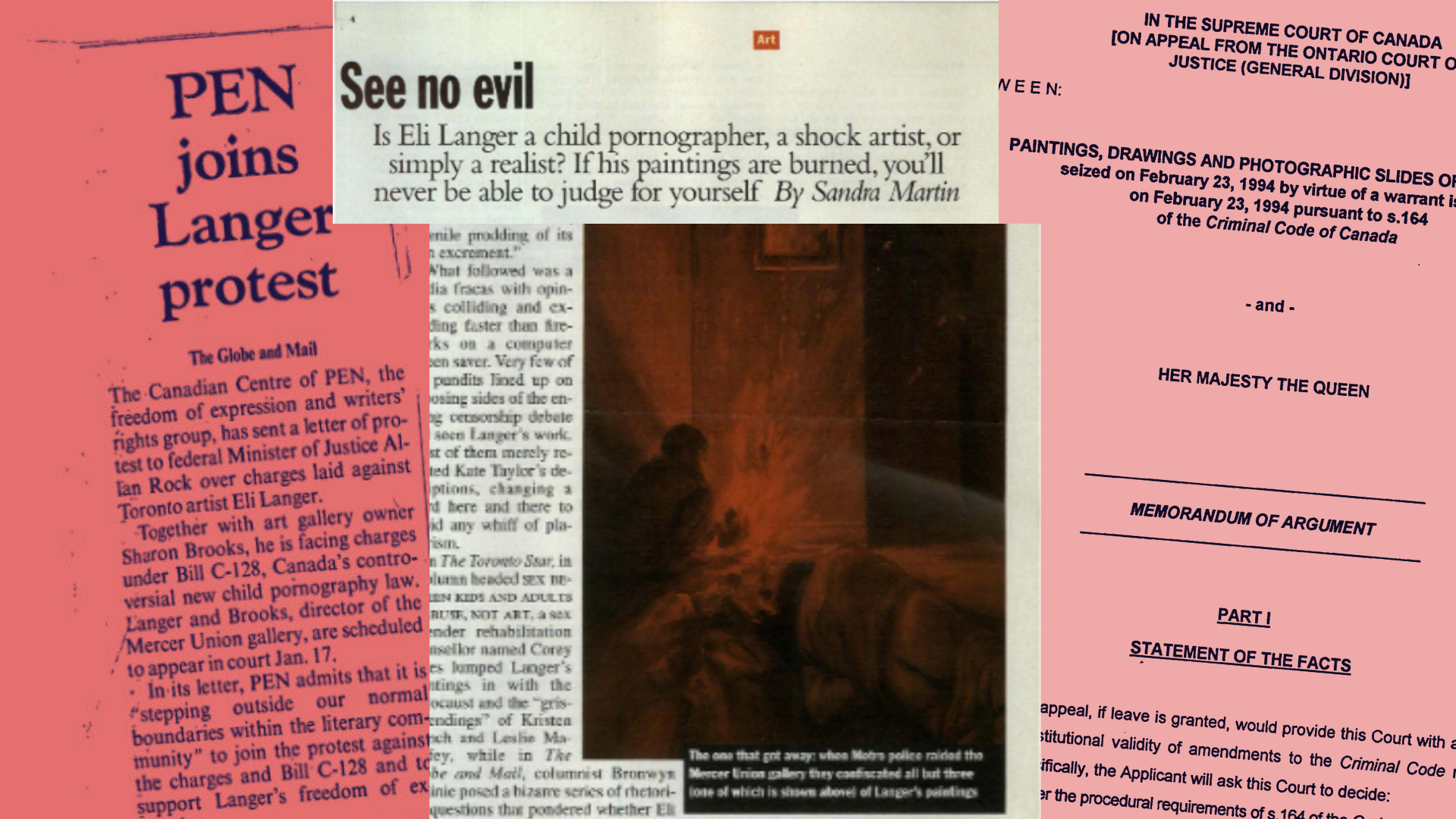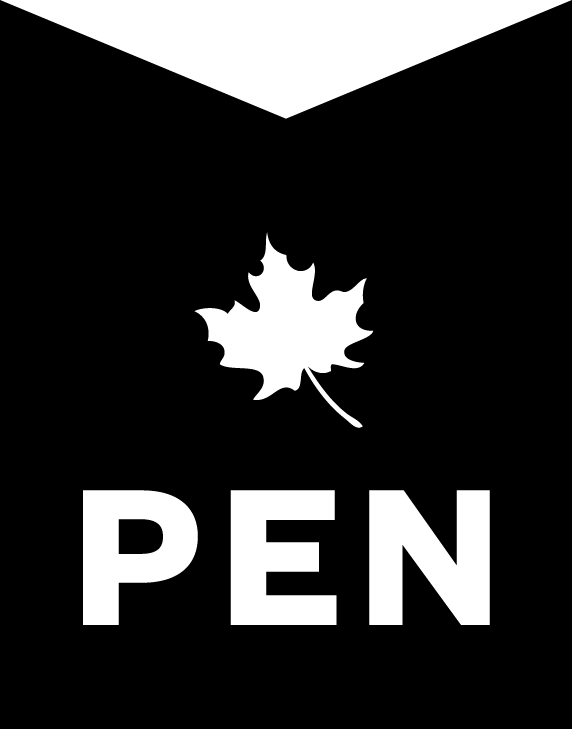National Affairs History
In its 40 years, PEN Canada has intervened in several landmark legal cases that upheld journalistic integrity and artistic freedom.
It has defended queer bookstores against customs seizures; championed Canadian journalists, columnists, writers and artists who refused to reveal sources or faced legal censure for their work, and it has fought to restore books to classrooms and library shelves.
Historically, PEN’s Canadian and Legal Affairs Committee has monitored various issues concerning free expression in Canada, including freedom of the press, book seizures, censorship in schools, and bills that abridge, or threaten, freedom of expression in Canada.
PEN Canada has issued hundreds of public statements and opinions on freedom of expression issues and appeared before Senate to raise concerns about censorious and restrictive legislation.The centre has also supported a host of journalists, opinion columnists, writers and artists who have faced legal censure for their work. Such cases included supporting Derek Finkle, Juliet O’Neill and Stephen Williams in their battles for journalistic integrity.
Case history at-a-glance
PEN has championed several landmark cases. These include the long legal struggle of Little Sisters Bookstore against customs censorship by the confiscation of queer-themed books at the border. In 2018, we successfully campaigned against a Bill C10 proposal that would have denied government support to films deemed “contrary to public policy.” PEN intervened in Grant v. Torstar and Quan v. Cusson, which led the Supreme Court of Canada to establish “responsible communication on matters of public interest” as a new defence against defamation. And PEN fought against the restrictive bail conditions imposed on some G20 protesters.
Book challenges: Canada Custom seizures

By 2007, Little Sister’s Book and Art Emporium had been in court for over two decades, fighting for the right to sell queer literature. The company was facing books seizures from Canada Customs, as were other retailers Bad Attitude Magazine, Inland Books and Glad Day Bookshop.
In response to one such challenge against Little Sister’s in 1993, members of PEN Canada unanimously adopted a resolution against the Canada Customs book and periodical seizures. That fall PEN Canada sponsored a resolution that was adopted at the 60th International PEN Congress, calling upon the government of Canada to respect the right of all Canadians to freedom of expression by halting all seizures of books and periodicals by Canada Customs officials.
The battle for Little Sisters’ rights continued, including a semi-victory in its 1996 court case, for which PEN expressed disappointment with Judge Smith’s ruling that Customs seizures were still considered constitutional. Then-PEN president Nino Ricci had stated that the ruling missed “the essential point that book seizures are in and of themselves unconstitutional.”
As the bookstore’s legal battles continued, PEN Canada supported Little Sister’s as an Intervener in their 2000 case at the Supreme Court of Canada. Ultimately, the court ruled in favor of the bookstore, affirming its right to sell LGBTQ+ publications without interference.
After a 2007 ruling, National Affairs Chair Christopher Waddell expressed PEN Canada’s deep regret on two counts, stating that “PEN Canada believes censoring and restricting freedom of expression in a free and democratic country is always a matter of compelling national interest, and is disappointed that the Supreme Court does not seem to share that view”. Waddell also noted that “it is disappointing that the Court does not acknowledge that individuals and small enterprises need support to challenge the arbitrary power of the state when it is employed against them. It is an essential check on the abuse of power by authorities and one that PEN Canada believes should be supported by public funds.”
Waddell drew attention to the fact that the Supreme Court’s decision came after the government of Prime Minister Stephen Harper cancelled a $2.8-million-a-year Court Challenges Program in September 2006 – a Trudeau-era program intended to protect the constitutional rights of minority and other marginalized groups by helping to finance their court battles. Had the ruling been in favour of Little Sister’s it could have set a precedent by which Ottawa would have to cover legal costs for ordinary people who question their treatment under the Charter of Rights and Freedoms.
Book challenges: censorship in schools
PEN has taken action to restore challenged books to school libraries and curricula, including bans and restrictions of Foxfire: Confessions of a Girl Gang, in 1997; Three Wishes: Palestinian and Israeli Children Speak, in 2006; and The Golden Compass in 2007. In the past, PEN has appealed to school boards and the Ontario Library Association urging them to reshelf the challenged books.
In particular, the case of Three Wishes drew impassioned criticism from PEN Canada:
- “You would be admitting that the school system is unable to deal with difficult topics, that educators would prefer that students turn their eyes away rather than read the words of children from war-torn cultures.” – Alan Cumyn (former chair, Writers in Prison Committee);
- “[T]his action sets a dangerous precedent which might well encourage future protests against a wide variety of books whose subject matter is objectionable to one group or another.” – Constance Rooke (former president, PEN Canada);
- “Don’t conceal books from children—let them read, let them think. Above all, listen to their voices. It’s our only hope.” – Rohinton Mistry (Giller Prize-winning author; former board member, PEN Canada)
Journalistic freedom, libel law and anti-SLAPP
In 2008, PEN joined a coalition in the Grant v. Torstar case, which introduced the “Responsible Communication on Matters of Public Interest Defense” in libel law. This defense protects journalists from defamation lawsuits if they can show their reporting was in the public interest and that they made reasonable efforts to verify the information.
In 2011, PEN intervened in Crookes et al. v. Newton, a case about whether providing hyperlinks to defamatory content could be considered publication.
Forced speech and political speech
In 2020, PEN successfully participated in the Canadian Civil Liberties Association’s challenge to Ontario’s “gas stickers” law, which was found to compel political speech by requiring gas stations to display specific stickers about carbon tax costs.
“PEN Canada welcomes Justice Morgan’s conclusion that speech compelled by the ‘gas stickers’ program is a violation of freedom of expression,” said Brendan de Caires, Executive Director, PEN Canada. “Our intervention helped clarify how Canadian law recognizes freedom of expression in this context and set out relevant international legal principles for the Court’s consideration. No government should be allowed to coerce participation in its political messaging.”
That same year, PEN intervened in the Canadian Constitution Foundation’s challenge to section 91 of the Canada Elections Act. The case argued that certain prohibitions during elections violated the right to free expression under the Canadian Charter of Rights and Freedoms.
In the law in question, Parliament made it an offense to attempt to influence an election by making or publishing certain kinds of false statements about political candidates or other public figures. Parliament amended the law in 2019 to remove the important requirement that, in order to be an offense, the person making the statement have knowledge that the statement being made was false. PEN Canada argued that the removal of that protection freed Parliament to punish a person – by fine or imprisonment — for political speech that was not knowingly false. This would have a chilling effect on political expression and the free exchange of ideas.
Artistic freedoms: the case of Eli Langer

At 26 years-old, Eli Langer, a Canadian visual artist, rose to prominence in 1993 with a solo exhibition at the Mercer Union Gallery in Toronto. The exhibition consisted of 8 paintings and 50 drawings addressing various issues of childhood sexuality. The show coincided with the addition of section 163.1 (the “Child Pornography” section) to the Canadian Criminal Code. Consequently, Toronto police raided Langer’s exhibition, seizing five paintings and 35 drawings, and arresting both Langer and the Mercer Gallery’s director.
PEN Canada joined other PEN centres and well-known Canadian artists in defending Langer’s right to exhibit his work. Our members unanimously adopted a resolution to support him at PEN Canada’s 1994 annual general meeting. PEN Canada also intervened in legal proceedings directed against Langer. acted as intervener on behalf of Eli Langer in his court defence.
In the May 1995 PEN Canada newsletter, board chair Marian Botsford Fraser wrote: “[The judge’s’] premise seems to be that the courts are the proper place to discuss such things. Surely the place for such debates is street corners, classrooms and living rooms; the freedom to create, to express and to agree and disagree should reside with the citizenry, not the courts … How long will it be before an artist or a writer takes the artistic risks Mr Langer took, in exploring a difficult subject like child abuse? And how long then before another artist or writer is subjected to the anguish, ignominy and cost of a trial, simply to prove that artists and writers not only have the right but the responsibility to address problems troubling society?”
In its December 1995 newsletter, PEN Canada wrote, “If the work of Eli Langer, clearly created for artistic purposes and exhibited in an established and reputable gallery, can be subject to this process, what artist in their right mind would risk dealing with potentially problematic material? And how is the public good served by this chilling effect? Will there be less sexual abuse of children if artists do not write about it or paint it?”
Appearances before the Senate
PEN Canada appeared before the Standing Senate Committee on Legal and Constitutional Affairs, giving testimony that was crucial to the defeat of Bill C-220 (1997 – 1998). Calling C-220 “the ultimate form of state censorship,” then-PEN Canada president Katherine Govier noted the legislation violated the derogation principles at the heart of Canada’s copyright law, and the provisions of the Berne Convention to which Canada is a signatory.
